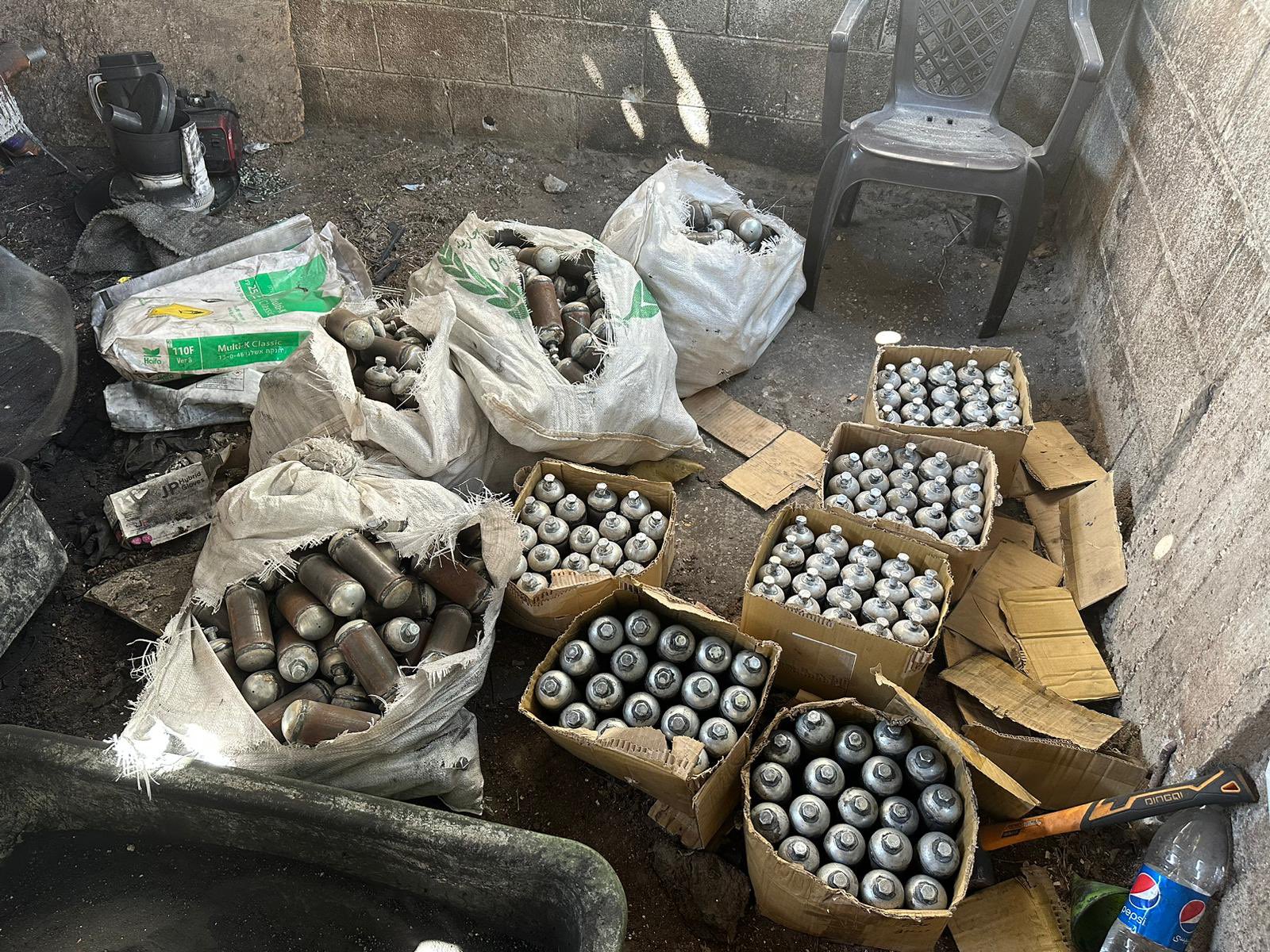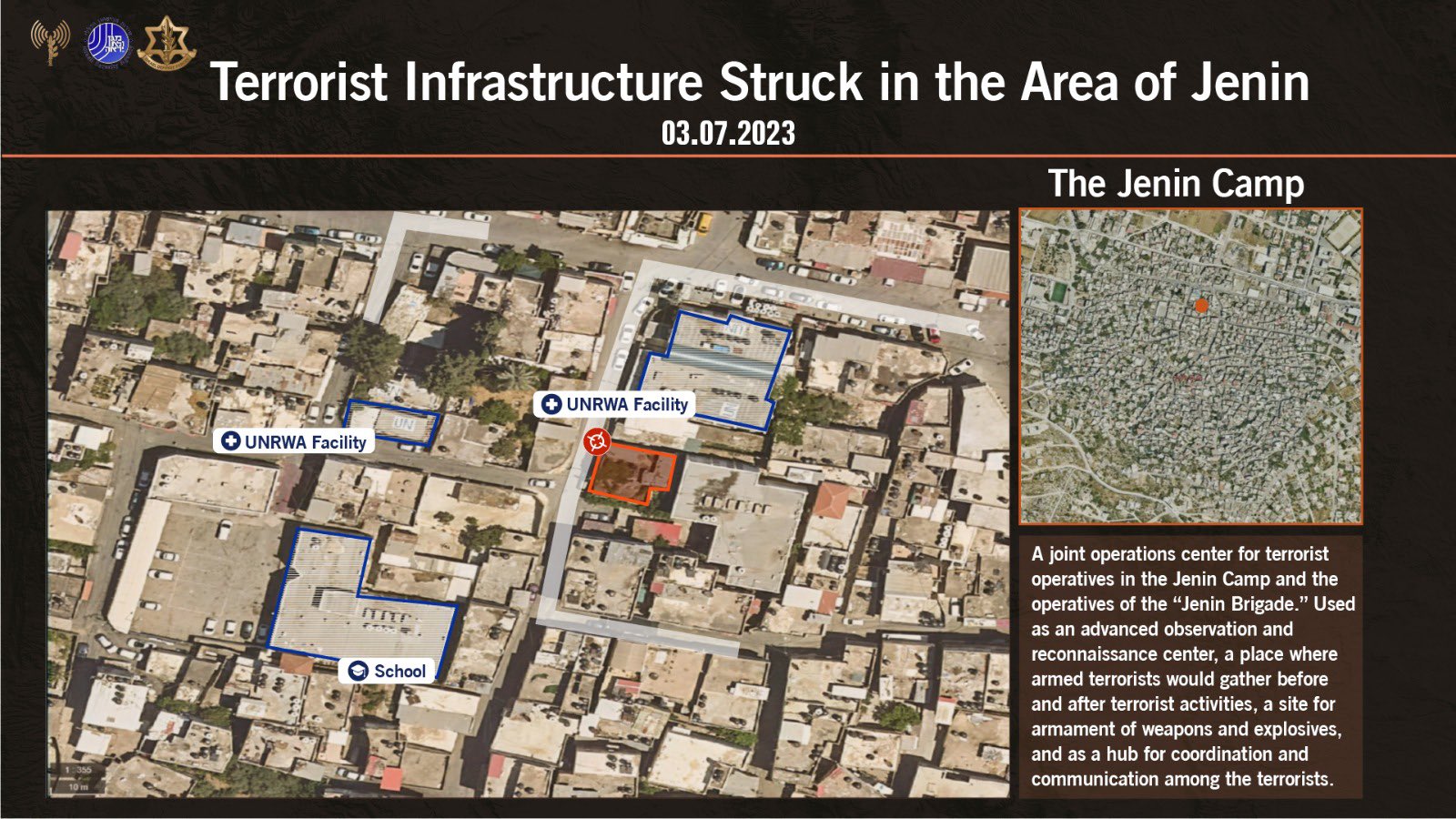A slightly different version of this article first appeared in The Algemeiner on July 6, 2023.
On July 2, 2023, the Israeli Defense Forces (IDF) launched a limited military operation against terrorist organizations operating in the town of Jenin in the northern area of the West Bank. It was the largest operation in Jenin since Operation Defensive Shield in 2002.
Those old enough will remember that during the 2002 operation Palestinian officials, aided by United Nations officials and international media coverage, spread one of the most notorious libels against the IDF: that of the “Jenin Massacre.” A senior Palestinian official claimed at the time that the IDF had killed some 500 Palestinians, when in truth only 52 were killed, the vast majority terrorist operatives or those engaged in combat.
With this history in mind, as ever, it is important to promote accurate coverage, including the important context surrounding and leading up to the events in Jenin. Here are five important details you may have missed in the media’s coverage of the events so far.
1. The Palestinian Authority’s Loss of Control
Despite its name, the Palestinian Authority has been demonstrating an inability to exert its authority. Though the Oslo Accords gave the PA substantial autonomy over much of the West Bank, towns like Jenin and Nablus have increasingly become ungoverned as rival factions exert growing control. In the words of one former PA official:
“It is a failure of the [Palestinian] National Authority, which has not managed to become [the foundation for] a proper civil state in which clans and tribes dissolve and whose citizens turn to it for legal succor and for law and order. Sadly, the [public’s] faith in the ability of the PA’s executive and judicial bodies to handle affairs, dispense justice, and settle conflicts between citizens is in decline. To resolve conflicts, citizens turn more to clan and tribal frameworks than to the PA institutions, which have begun to lose control over society and over the [armed] gangs– due to the collapse of moral values, the deterioration of the rule of law and the absence of motivation by the PA itself to fulfill its duties. Beyond all this, the presence of corruption often prevents the PA from addressing the root of these problems fairly and according to the law.”
The loss of control is such that PA security forces have hesitated to even enter places like Jenin “for fear they would be harmed,” and when they do, they are often met with substantial violence. PA officials have instead largely resorted to expressing desperation, charging that Hamas and Islamic Jihad “are conspiring against the Palestinian leadership” in the West Bank.
The danger presented by the situation has forced Israel’s hand, with the IDF carrying out numerous counterterror raids in reaction to a sharp rise in terror attacks against Israelis originating in places like Jenin. According to the IDF, over 50 shooting attacks have emanated from Jenin in 2023 alone. Demonstrating just how much the PA has lost control of the situation, there have even been attempts to launch rockets from Jenin toward Israeli communities.
In the words of then Israeli military chief Aviv Kohavi in September 2022, “Part of the increase in terrorism stems from the helplessness of the Palestinian Authority security forces, leading to a lack of governance in certain areas of Judea and Samaria, and these are fertile grounds for terrorism.” Already this year, Palestinian terrorism has killed 24 people (not counting an Israeli killed by a rocket from Gaza).
2. The Iranian Role
As CAMERA’s Sean Durns wrote in September 2022, “The decline of the PA’s influence, and the commensurate rise of Iranian-sponsored rivals, is newsworthy.” With the PA unable to exert its authority over parts of the West Bank, Iran’s proxy forces have filled the vacuum, and the Iranian regime has exploited the situation to wage its war against the Jewish state. Yet these significant trends have been left largely unreported by international media outlets.
The role played by Iran isn’t hidden. Just this month, Islamic Jihad’s leader, Ziyad al-Nakhalah, confirmed that Iran was arming the terrorists in the West Bank, and that it was at the direct instruction of Iranian Supreme Leader Ali Khamenei. Senior Iranian leaders, including commander of Iran’s Revolutionary Guard Corps Hossein Salami, have long been boasting of their efforts in “arming the West Bank…to defeat Israel.” Further demonstrating Abbas’s inability to exert control, according to PA officials even terrorists belonging to Fatah – Mahmoud Abbas’ own party – are “on the payroll of Iran and its Palestinian proxies.”
3. The Growing Threat of IEDs
The danger emanating from Jenin is not just a matter of quantity, but also quality. A new threat is emerging: improvised explosive devices (IEDs). The deadly tactic that American soldiers once faced in places like Iraq – a threat the Iranian regime also helped create – has now become an increasingly common and serious threat to Israeli soldiers and civilians alike. Just a couple of weeks ago one such explosive device, planted by the Iranian proxy group Islamic Jihad, wounded eight IDF soldiers.
During the operation in Jenin the IDF captured “explosives manufacturing facilities” containing “hundreds of explosive devices, along with a guidebook on how to make additional explosive devices.”

IEDs captured during the operation in Jenin.
4. Use of Mosques and Other Civilian Facilities by Terrorists
Like their fellow terrorists in the Gaza Strip, it is becoming evident that the terrorists in Jenin have worked to exploit civilian infrastructure, thereby putting civilians in harm’s way. During the recent operation, Palestinian terrorists fired on Israeli forces from a mosque. Upon entry into the mosque, the IDF located explosives and weapons hidden throughout the building, including in two subterranean pits.
Similarly, an “advanced observation and reconnaissance center” used by terrorists in Jenin was located next to two UNRWA facilities and a school. The center had been used as “an observation post, a gathering place for armed terrorists, a storage site for weapons and explosives and a contact and communication center for operatives.”

The location of the Jenin terrorist operation center near UNRWA facilities and a school.
5. IDF Efforts to Minimize Civilian Casualties
Whereas Palestinian terrorists have worked to embed themselves among the civilian population of Jenin, Israeli forces have taken action to keep civilians out of harm’s way. According to Palestinian reports, residents of Jenin were “sent text messages asking them to remain indoors.” The message: “Security forces are operating in the area against the militants. Stay at home and protect your family.” Simultaneously, “members of armed groups had received texts urging them to lay down their arms and turn themselves in.” The IDF’s efforts appear to have been successful, with no confirmed reports of civilian casualties in Jenin.
